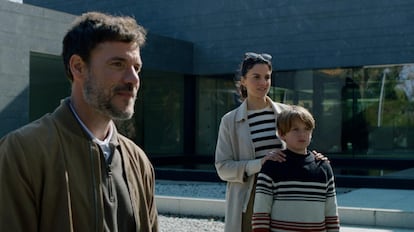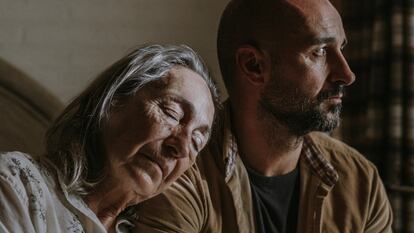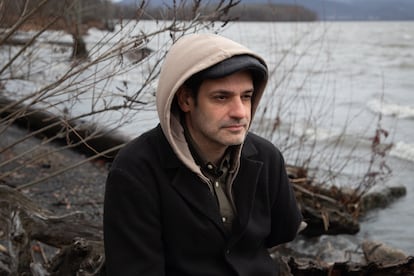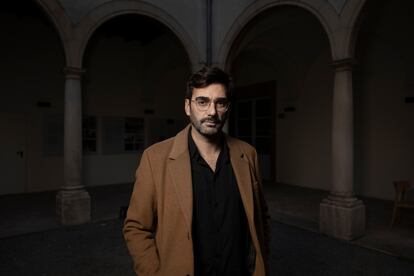Dani Feixas (L’Esquirol, Barcelona, 46 years old) connects electronically from his studio in Vic. Àlex Lora (45 years old, Barcelona) does so from Los Angeles. Although they share Catalan origin and generation, the trajectories and lives of these two directors until they managed to have a short film at the gates of the Oscars are almost opposite, but their speech is found when they talk about objectives and work mentality: “We are hard workers.” , they agree. Both have reached the final phase before the nominations, which will be announced on January 19.
In fact, although they have never met in person, they had already met again virtually. When Lora went to live in the United States in 2010, he had to sell his technical equipment and Feixas was one of those who contacted him to see what he had. “Surely we have a few friends in common, but there are a lot of us making short films,” says Feixas. Beyond chance, his films, however, inhabit different universes. In Feixas, Paris 70written by Nach Solís (can be seen on Filmin), the center is the “white lies” (as he calls them) of a man who cares for his mother with Alzheimer’s. The great workby Lora, with a script by Alfonso Amador and Lluís Quílez, places the viewer in a domestic situation in which racial prejudices come into play in a house that takes us back to parasites, the Korean film that won the 2019 Oscars, about a poor family that infiltrates a mansion.
“All short filmmakers know that for a short film to work better it has to have an underlying social theme, and thus have an impact beyond cinema. Because of our name it’s not going to sell, so the way is to capture what you’re talking about,” explains Feixas, who with his work, also nominated for the Goya in 2024 (Lora’s is this one), has won 150 awards in different places. festivals: “We have gone from the most glamorous to towns with beer chairs and inflatable screens. That background work makes the path flow.”
Lora relates this social part to her disability: “I am missing an arm, and the issue of disability always catches my attention. It’s something I’m looking for. “That lack leads me to the social.” The director, who had already been to Sundance, won the Grand Jury Prize with his latest work: “I also had a lot of rejections. And they get 12,000 shorts, and it happened because of a little bit of luck. I even uploaded it without subtitles, but then an acquaintance who saw it wrote to me to tell me that he was too old to learn Spanish, and I uploaded it again.”
But how much does it cost to get here? Lora, who has spent more than 20,000 euros in this campaign, explains it: “A winning candidacy can easily reach 30,000. If you pass phases, you continue paying for events. I know people who reach 100,000 and it is said that Netflix invested half a million in Wes Anderson’s. Perhaps the new voting system favors those who spend it, to be visible among the 180 candidates.”

There are more similarities between them. The two have regularly worked on the documentary. And both have experienced ups and downs (something surely applicable to the entire industry). To manage to direct, Feixas has worked in television, doing making of in Sitges, a lot of advertising, more than 30 video clips, as a university professor… “During the pandemic, due to the lack of advertising, I started making short films,” he remembers. Lora, who was not a very good student, did homework in high school and took refuge in the Filmoteca in Barcelona to learn. In 2009 he began to make his mark with (On) terraces. From there she jumped with a Fulbright scholarship to New York, where she had Chantal Akerman as a mentor, from whom she remembers two fundamental pieces of advice: “Take the cheapest tripod and don’t move the camera, and make documentaries to learn how to make fiction.”
This long path has led them to be two of the 15 chosen that make up the final list of pre-candidates for the 2025 Oscars. Although none of them say they are still thinking about the gala, if they were to pass the last screening they would follow a brilliant trail that adds up to date 10 nominees for the Spanish short film. It was inaugurated in 1996 by Juan Carlos Fresnadillo and followed by Nacho Vigalondo, Borja Cobeaga, Javier Fesser, Javier Recio and Rodrigo Sorogoyen, among others. Why so many Spanish names? “As a young person you have energy, and you have to get it out. You are prepared, but in Spain it is so difficult to make feature films that this is what remains. Nobody invests in you, and as a newbie, you have no points. The short is the way out. You do one and the other, and each time they come out better. Without aid. The average age to do a feature has risen a lot,” explains Lora: “I’m a hard worker. I may not have the talent that others have, but it was my passion. “My brother said I was born haunted, I spent editing until four in the morning.”

This year there are two Spanish short films in this selection. Two years ago there were four, out of 15, a notable percentage. “And yet it is not considered an industry,” Feixas protests. “You should be able to dedicate yourself to this format without wanting to make feature films, and that it serves to live, that the festivals pay something, that the televisions and platforms bet on it and pay, and not program them only when we are nominated. It would also be essential to create the short film specialty branch at the Film Academy. Without that we don’t go anywhere either to vote or to demonstrate that this is cinema, something that has been claimed for a long time,” he adds.
They also do not feel recognized in national awards. “When everyone votes without knowing, many from other categories do so because of what they know or maybe they vote for their friends. Friendships are created and lobbys difficult. We feel like the last monkey,” Lora agrees. “Paris 70 It was not even among the Gaudí finalists. It was not one of the 10 best Catalan shorts of the year. Things at home hurt more,” Feixas responds: “Although we are used to saying no,” they say in one of the most repeated phrases in the talk.

The chapter at the doors of the Oscars is one more. “I’ve made a lot of short films these 20 years and I’m used to being told no,” Lora convinces himself, involved in the campaign towards the night of March 3: “It’s not particularly a dream, although it would be nice to have two nominated Catalans. But what I want is to look forward, think about the next project, see how this helps,” he says, already seasoned by the disappointment of receiving Unicornshis first feature length fiction. Feixas thinks the same: “It’s part of the journey. What we want is to be able to work and live from it. If being nominated helps me, ideal. If it’s for self-aggrandizement, I’m not interested. This is another mechanism. “The gala thing even makes me a little lazy, I look like a mosquito.” At the moment, he is working on converting the universe of Paris 70 in feature film with The queen of the fairies, an expansion of the couple’s universe, played by Luisa Gavasa and Alain Hernández.
The future remains open for Feixas: “I have been self-employed for 20 years, working alone, but I am happy working what I want. I have been a cameraman, editor, producer, I have made video clips losing money, campaigns for associations… and now I am finally reaching my goal of directing. My dream is to continue living from this. My system is to not stop working.” Lora is preparing another feature: “I’m going to Spain in June, but I would also like to film in the United States and do other things, like working with disabled kids with their short films and supporting associations for inclusion. “It could be a nice legacy.” In any case, with or without an Oscar nomination, both will continue working.

